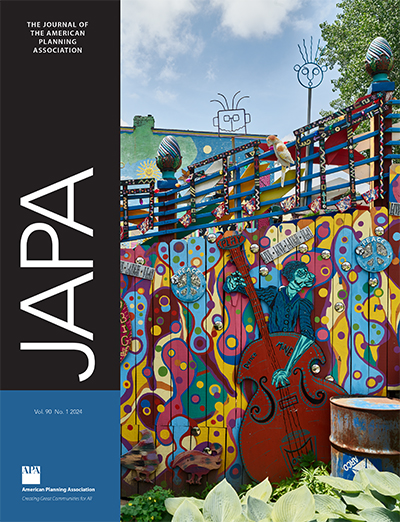Anti-Racist Futures: Disrupting Racist Planning Practices in Workplaces, Institutions, and Communities
IF 3.4
2区 经济学
Q1 REGIONAL & URBAN PLANNING
Journal of the American Planning Association
Pub Date : 2023-09-29
DOI:10.1080/01944363.2023.2244850
引用次数: 0
Abstract
In this editorial, we address the concepts of diversity, multiculturalism, equity, racial equity, racism, anti-racism, and intersectionality in urban planning. Despite their significance, these concepts have not received sufficient attention in the mainstream planning discourse. We argue that prioritizing anti-racism is essential for fostering effective anti-racist praxis in planning, leading to institutional and structural change. The special issue introduces key terms and papers, highlighting the importance of context, intersectionality, and Black, Indigenous, and People of Color (BIPOC)/community-led initiatives. In addition, we emphasize the need for reparative planning practices to address historical injustices and disrupt structural racism in the planning field. We call on urban planners to integrate anti-racism as a core principle in their praxis. By dismantling entrenched systems of racism and embracing intersectional approaches, the field of urban planning can contribute significantly to the pursuit of equitable and inclusive urban environments for all. Prioritizing anti-racism, embracing intersectionality, and incorporating reparative planning practices are crucial steps for urban planners to create institutional and structural changes in the planning field. Integrating anti-racism as a core principle can lead to more equitable and inclusive urban environments, addressing historical injustices and promoting positive transformations.反种族主义的未来:破坏工作场所、机构和社区中的种族主义规划实践
在这篇社论中,我们讨论了城市规划中的多样性、多元文化、公平、种族平等、种族主义、反种族主义和交叉性等概念。尽管这些概念具有重要意义,但在主流规划话语中却没有得到足够的重视。我们认为,优先考虑反种族主义对于在规划中促进有效的反种族主义实践至关重要,从而导致制度和结构变革。本期特刊介绍了关键术语和论文,强调了背景、交叉性以及黑人、土著和有色人种(BIPOC)/社区主导倡议的重要性。此外,我们强调需要进行补偿性规划实践,以解决历史不公正问题,并破坏规划领域的结构性种族主义。我们呼吁城市规划者将反种族主义作为其实践的核心原则。通过拆除根深蒂固的种族主义制度和采用交叉方法,城市规划领域可以为追求人人享有公平和包容的城市环境作出重大贡献。优先考虑反种族主义,拥抱交叉性,并纳入补偿性规划实践是城市规划者在规划领域进行制度和结构变革的关键步骤。将反种族主义作为一项核心原则,可以带来更加公平和包容的城市环境,解决历史上的不公正现象,促进积极的变革。
本文章由计算机程序翻译,如有差异,请以英文原文为准。
求助全文
约1分钟内获得全文
求助全文
来源期刊
CiteScore
11.00
自引率
10.70%
发文量
80
期刊介绍:
For more than 70 years, the quarterly Journal of the American Planning Association (JAPA) has published research, commentaries, and book reviews useful to practicing planners, policymakers, scholars, students, and citizens of urban, suburban, and rural areas. JAPA publishes only peer-reviewed, original research and analysis. It aspires to bring insight to planning the future, to air a variety of perspectives, to publish the highest quality work, and to engage readers.

 求助内容:
求助内容: 应助结果提醒方式:
应助结果提醒方式:


